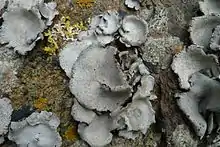| Dermatocarpon | |
|---|---|
 | |
| Dermatocarpon miniatum | |
| Scientific classification | |
| Domain: | Eukaryota |
| Kingdom: | Fungi |
| Division: | Ascomycota |
| Class: | Eurotiomycetes |
| Order: | Verrucariales |
| Family: | Verrucariaceae |
| Genus: | Dermatocarpon Eschw. (1824) |
| Type species | |
| Dermatocarpon miniatum (L.) W.Mann (1825) | |
| Synonyms[1] | |
Dermatocarpon is a genus of lichens in the family Verrucariaceae.[2]
Members of the genus are commonly called stippleback lichens because they have fruiting structures called perithecia that are flask-shaped structures embedded in the nonfruiting body (thallus), with a hole in the top to release spores, causing an appearance of being covered with small black dots.[3]: 35
Species
- Dermatocarpon americanum Vain. (1926)
- Dermatocarpon arenosaxi Amtoft (2008)[4] – United States
- Dermatocarpon arnoldianum Degel. (1934)
- Dermatocarpon atrogranulosum Breuss (2003)[5] – Canada
- Dermatocarpon bachmannii Anders (1922)
- Dermatocarpon deminuens Vain. (1921)
- Dermatocarpon dolomiticum Amtoft (2008)[4] – United States
- Dermatocarpon intestiniforme (Körb.) Hasse (1912)
- Dermatocarpon leptophyllodes (Nyl.) Zahlbr. (1922)
- Dermatocarpon leptophyllum (Ach.) K.G.W.Lång (1921)
- Dermatocarpon linkolae Räsänen (1934)
- Dermatocarpon lorenzianum Anders (1922)
- Dermatocarpon luridum (Dill. ex With.) J.R.Laundon (1984)
- Dermatocarpon meiophyllizum Vain. (1921)
- Dermatocarpon moulinsii (Mont.) Zahlbr. (1903)
- Dermatocarpon miniatum (L.) W.Mann (1825)
- Dermatocarpon muhlenbergii (Ach.) Müll.Arg. (1885)
- Dermatocarpon multifolium Amtoft (2008)[4] – United States
- Dermatocarpon polyphyllizum (Nyl.) Blomb. & Forssell (1880)
- Dermatocarpon reticulatum H.Magn. (1932)
- Dermatocarpon rivulorum (Arnold) Dalla Torre & Sarnth. (1902)
- Dermatocarpon schaechtelinii Werner (1934)
- Dermatocarpon taminium Heiðm. (2003)[6]
- Dermatocarpon tenue (Müll.Arg.) Heiðm. (2003)[6]
- Dermatocarpon tomentulosum Amtoft (2006)[7] – USA; Bahamas
- Dermatocarpon vellereum Zschacke (1934)
References
- ↑ "Synonymy: Dermatocarpon Eschw., Syst. Lich.: 21 (1824)". Species Fungorum. Retrieved 21 April 2021.
- ↑ Wijayawardene, Nalin; Hyde, Kevin; Al-Ani, Laith Khalil Tawfeeq; Somayeh, Dolatabadi; Stadler, Marc; Haelewaters, Danny; et al. (2020). "Outline of Fungi and fungus-like taxa". Mycosphere. 11: 1060–1456. doi:10.5943/mycosphere/11/1/8. hdl:10481/61998.
- ↑ Field Guide to California Lichens, Stephen Sharnoff, Yale University Press, 2014, ISBN 978-0-300-19500-2
- 1 2 3 Amtoft, Anja; Lutzoni, François; Miadlikowska, Jolanta (2008). "Dermatocarpon (Verrucariaceae) in the Ozark Highlands, North America". The Bryologist. 111 (1): 1–40. doi:10.1639/0007-2745(2008)111[1:DVITOH]2.0.CO;2. S2CID 85922942.
- ↑ Breuss, O. (2003). "Eine neue Dermatocarpon-Art (lichenisierte Ascomyceten, Verrucariales) aus Kanada". Bibliotheca Lichenologica (in German). 86: 99–102.
- 1 2 Heidmarsson, S. (2003). "Molecular study of Dermatocarpon miniatum (Verrucariales) and allied taxa". Mycological Research. 107 (4): 459–468. doi:10.1017/S0953756203007652. PMID 12825519.
- ↑ Amtoft, Anja (2006). "A new species of Dermatocarpon (Verrucariaceae) from the United States and the Bahamas". The Bryologist. 109 (2): 182–184. doi:10.1639/0007-2745(2006)109[182:ANSODV]2.0.CO;2. S2CID 85307620.
Gallery
This article is issued from Wikipedia. The text is licensed under Creative Commons - Attribution - Sharealike. Additional terms may apply for the media files.

